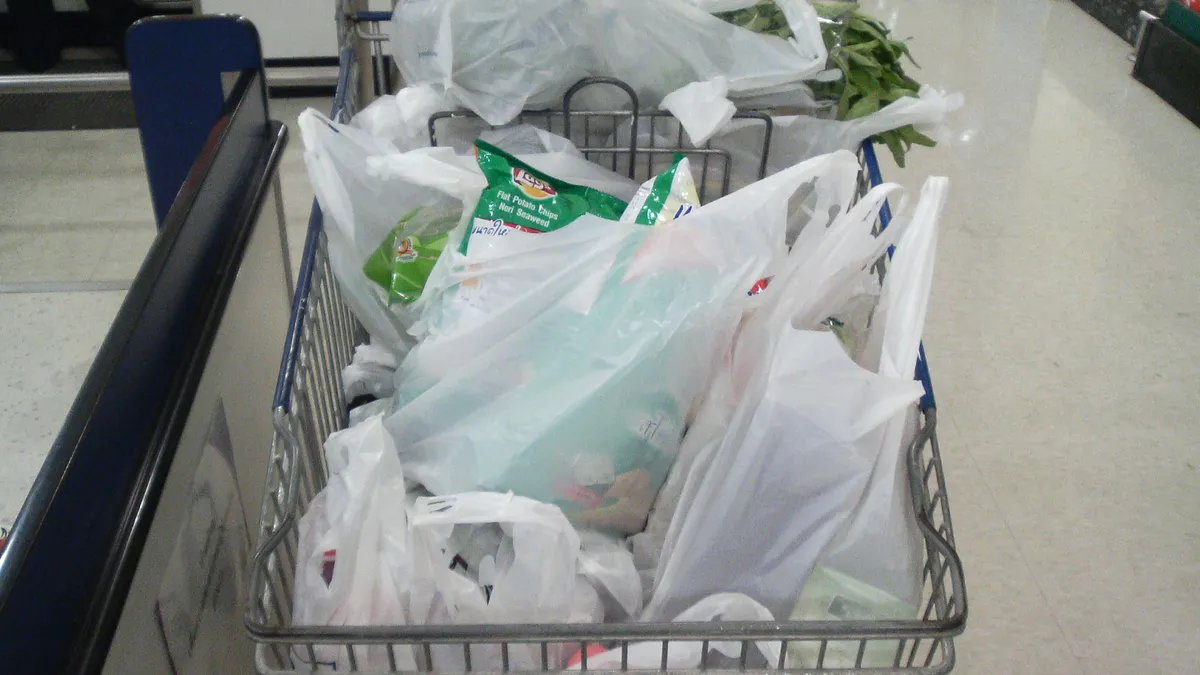Dive Brief:
-
A third of U.S. consumers and 52% of those in the U.K. support a tax on all plastic food packaging, according to an online survey commissioned by Ingredient Communications and conducted by Surveygoo.
-
The survey of 1,000 consumers also found many consumers (41%) would be more likely to frequent supermarkets that offer fruit and vegetables without plastic packaging. In the U.S., 38% said they would be more likely to do so.
-
A release about the survey noted that a law that went into effect in England in 2015 requiring large retailers with 250 employees or more to charge for plastic bags has reduced their use in the country by more than 80%.
Dive Insight:
The results of this online survey indicate that quite a few U.S. consumers care about whether their food is packaged in plastic or not, although not as much as U.K. consumers do. Concern about plastic packaging could be higher across the pond because of greater community awareness of this issue following the 2015 law that requires large retailers to charge for single-use plastic bags.
According to analysts, retail taxes or fees on disposable plastic bags — like the 7 cents per bag Chicago began charging last year — have limited the number of bags in use without a major effect on overall sales. Some people may decide to shop at stores where they can still get single-use plastic bags, but others probably get used to it and remember to bring recyclable bags or boxes when they go to the store. Others may bring their own produce bags to buy fruits and vegetables or other items if they don't come packaged in plastic.
A number of large cities, including Seattle; San Francisco; Chicago; Washington, D.C.; Austin, Texas; Boulder, Colorado; and Portland, Maine, have banned plastic bags, and two states — Hawaii and California — have also done so.
Some retailers are doing their part to cut down on plastic use. Starbucks plans to replace all single-use plastic straws with recyclable paper straws and strawless lids by 2020, and PCC Community Markets in Seattle says it will replace plastic packaging in its deli department with biodegradable alternatives by 2022.
While many of these companies care about their environmental footprint and the cost involved in using single-use plastic, they're undoubtedly aware that consumers are more willing to patronize businesses that illustrate their commitments with tangible action. According to Nielsen, a company’s adherence to environmental stewardship influences product purchases for 45% of consumers — and those that don't walk the walk could lose millions in sales to their competitors that do.
Consumers aren't the only ones applying pressure. The Plastic Solutions Investors Alliance, which includes 25 investors managing more than $1 trillion in assets, has asked Nestlé, Unilever, PepsiCo and others to reveal their annual use of plastic packaging and set reduction goals while switching to recyclable, reusable or compostable packaging when possible. According to Bloomberg, those three companies have already agreed to phase in by 2025 packaging made from recyclable, compostable and biodegradable materials with more recycled content. It will be interesting to see how quickly this pressure will expand to broader plastic use in CPG packaging and grocery prepared foods, which has also become a point of consumer concern over the years.








